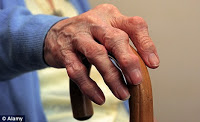Study says older adults with arthritis need 45 minutes of moderate activity per week, much less than federal guidelines recommend

 |
|
Daily Mail photo
|
Older adults with arthritis need 45 minutes of “moderate activity” a week to maintain functional independence, a study has concluded.
That’s about one-third the amount called for by federal guidelines, which say people need 150 minutes of moderate activity per week. Only one in 10 older Americans with arthritis in their knees meet that guideline, says the news release from Northwestern University, where the research was conducted.
“Even a little activity is better than none,” Dorothy Dunlop, the study’s lead author, said in the release. “For those older people suffering from arthritis who are minimally active, a 45-minute minimum might feel more realistic.” Researchers said more than 20 minutes of exercise a day is “daunting” for people as they age, especially with arthritis.
The study found that approximately one-third of people in the study improved or had higher function after two years of increased exercise, and those who had at least 45 minutes of moderate activity, like brisk walking, had the best results: 80 percent of them were more likely to improve or sustain a high level of functioning over two years, compared to those who did less.
The study, published online in the journal Arthritis Care & Research, used movement-monitoring equipment to measure the physical activity of 1,600 adults who had pain, aching or stiffness in their bones, knees or feet.
The federal guidelines say 150 minutes a week of moderate activity, in sessions last at least 10 minutes, is good for cardiovascular health. This study found that if the goal is to maintain functionality, the 45 suggested minutes of moderate activity could be spread out and did not have to be done in 10-minute sessions.
“We’re looking for an older population who can be functionally independent,” Dunlop said. “And we were interested in seeing what kind of physical activity might be beneficial to promote good function down the road. We found moderate-intensity activity rather than light activity, such as pushing a grocery cart, to be more valuable to promote future function.”